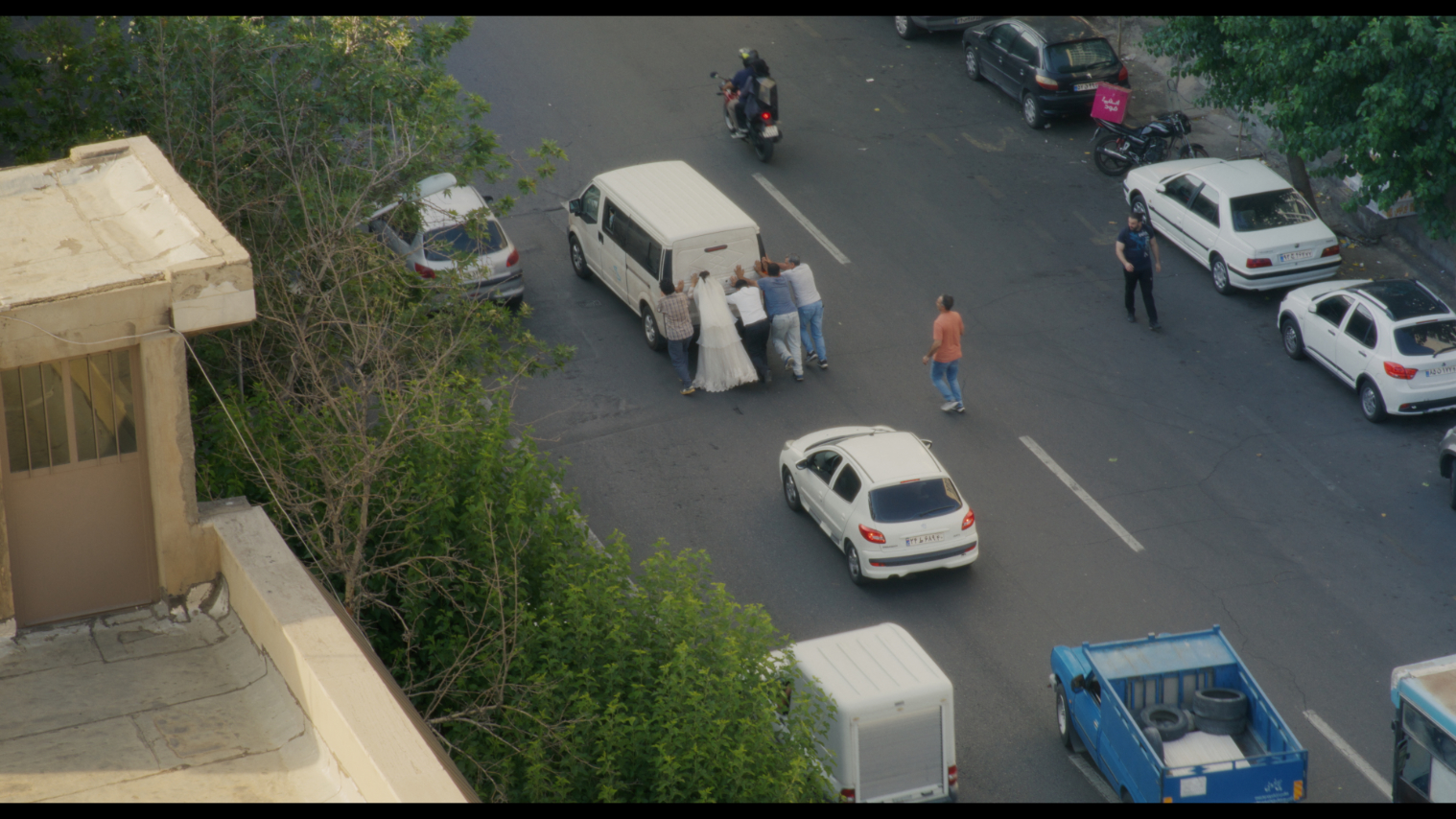It all starts with an accident. A family – father (Ebrahim Azizi), daughter, pregnant mother – are travelling at night, on a dark road, and their car hits and kills a dog. The daughter is upset, and her mother reassures her – the road was so dark, and what will be will be. But in a prescient moment, the mother suggests that God put the animal on their path for a reason – a reason that will soon become apparent.
Because this accident leads to another accident – an accidental meeting of sorts. Soon after hitting the dog, their car stops working right in front of a workshop. One of the men there offers to help fix the car, which is how Vahid (Vahid Mobasseri) hears the squeak of the father’s artificial leg. The sound triggers something in Vahid, something deep and frightening. Vahid follows their car, stalking this man who elicits such a terrifying response in him, and eventually abducting him. Because Vahid believes the man is Eghbal, also known as Peg Leg (because of the artificial limb that he’s needed since being injured in Syria), an intelligence officer who tortured Vahid. Vahid has never seen Eghbal, as he was blindfolded the whole time he was being tortured while in custody, so he is relying on his sense of hearing to identify Eghbal purely by the squeak of his artificial leg.
Vahid acts out of emotion, out of pure fear and desperation, and initially plans to bury Eghbal alive in the desert. But he has a moment of confusion, doubting whether he has the right man. Vahid then begins a quest to find other victims of Egbhal, to try to get them to see if they can confirm the man’s identity. These include: Shiva (Maryam Afshari), a photographer, who only remembers the smell of Eghbal; Golrokh (Hadis Pakbaten), a bride whose distress at the mere thought of Eghbal causes her to faint, and who needs to hear his voice; and Hamid (Mohamad Ali Elyasmehr), a hothead who can identify Eghbal by touch, by feeling his legs and remembering the scars the man had.
The fact that none of these people had actually seen their oppressor allows for the film to explore a moral dilemma. Even if you feel wronged by having been arrested on the flimsiest of reasons, these characters are not like the government and its representatives. They are aware of the moral dilemma they face: they want Eghbal to be punished for what he did to them, but if they choose to punish him, does that not make them as bad as him and the government he represents? If they decide they need to behave in a way that is better, then what happens to them if Eghbal can recognize them? What retribution awaits them? Salar, the first person Vahid goes to see, tells Vahid to consider the consequences: “We aren’t killers,” he tells Vahid. “We’re not like them. There’s no need to dig their graves. They’ve done it themselves. It’s your ideals you’d be burying.”
Jafar Panahi has long been a thorn in the side of the Iranian government, refusing to work within the rules set out by censors, refusing to bow to the attempt to repress his art. His films and the attention to them internationally set him firmly in the headlights of the Iranian regime, becoming a target himself, arrested, persecuted, subject to torture, barred from foreign travel, spending six years in prison and facing a twenty year ban on making films, writing scripts, and even discussing filmmaking abroad. Many people would give up and move on – but Panahi worked to find other ways of making films. This new way of working led to the iconic This Is Not a Film, shot on an iPhone.
This clandestine style of filmmaking led ultimately to It Was Just an Accident, which deservedly won the Palme d’Or at the Cannes Film Festival in 2025. Shot guerilla-style with a handheld camera and cinematography by Amin Jafari, the film focusses on its characters, mainly in the confines of the van that Vahid has abducted Eghbal in. And, in fact, we rarely see much of Egbhal until the end of the film. But this intense focus on the characters allows us to see ourselves as one of them, to feel their pain and their anger, to feel their helplessness and their humanity.
It Was Just an Accident is a political film played out on a deeply personal level. And as Ali (Majid Panahi), Golrokh’s groom suggests: “This is a quagmire. The further you go, the further you sink.” The film explores doubt, morality, and yes, bravery, and the sad and harrowing truth that these people will always be haunted by their prison experience. As will we be haunted by listening to their truths.

